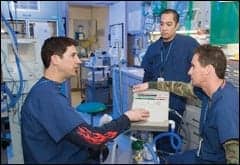The team General Motors (GM) and Ventec Life Systems assembled to help fight the COVID-19 pandemic has delivered its 30,000th V+Pro critical care ventilator to the U.S. Department of Health and Human Services, the companies announce.
At the start of the COVID-19 pandemic, GM and Ventec collaborated to rapidly scale up production of critical care ventilators. In one month, the teams went from an introductory phone call to delivering life-saving technology to frontline medical workers. The full federal order was completed in just 154 days, with one ventilator completed about every seven minutes.
With yesterday’s shipment, GM has formally turned over operational control of the company’s Kokomo ventilator manufacturing operation to Ventec. Ventec will produce VOCSN multi-function, critical-care ventilators in Kokomo, as well as in Bothell, Wash., in response to ongoing demand during the pandemic. Ventec’s monthly ventilator production increased 80 times during the pandemic.
“Our drive to put critical care ventilators into production was fueled by thousands of people at GM, Ventec, and our suppliers who all wanted to do their part to help save lives during the pandemic,” says Mary Barra, GM chairman and CEO. “It was inspiring to see so many people achieve so much so quickly.”
“Our hope continues to be that mitigation efforts stop the spread of this virus. Ventec Life Systems is committed to maintaining increased production capacity for as long as it is needed to ensure frontline healthcare workers have the tools necessary to save lives,” adds Ventec Life Systems CEO Chris Kiple. “We are incredibly proud of how our teams came together united by a common mission.”
One of the first medical facilities to receive a GM-Ventec ventilator was Weiss Memorial Hospital in Chicago. “We are very grateful to Ventec Life Systems and General Motors for the critical care ventilators we received in April,” says Suzanne Pham, MD, hospitalist at Weiss Memorial Hospital. “The devices built in just one month are currently helping patients battling COVID-19, and are valuable tools enabling our medical team to save lives.”





